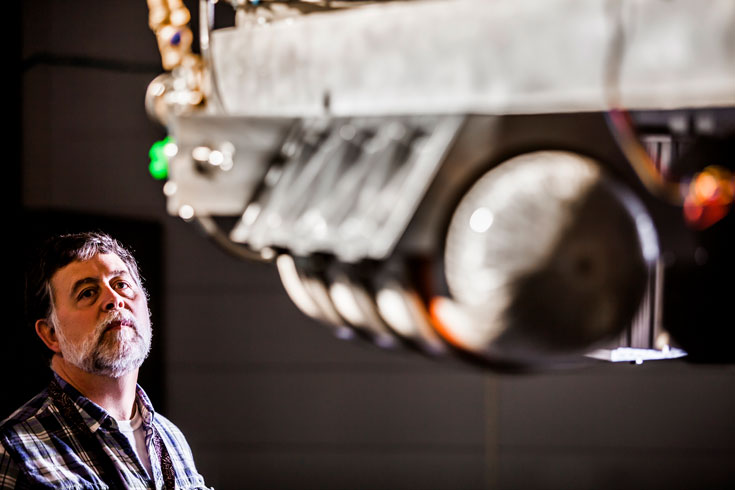Lab Retirees Lend Expertise to Local Small Businesses

A group of retirees from the Labs and Air Force Base is working with startups and small businesses in Albuquerque who need their advanced skill sets—for free.
New Mexico is home to some of our country’s highest level scientists, engineers, and technology professionals: Sandia National Laboratories, Los Alamos, and Kirtland Air Force Base employ thousands of highly skilled specialists working on everything from particle accelerators to advanced solar technology. When people retire from those jobs they don’t just stop; they often seek out ways to engage their penchant for problem solving. You’ve probably known one or two of these science or tech workers who take up woodworking, distilling, or some other technical pastime in retirement because they can’t just turn off that part of themselves.
While some retirees put their time towards helping out in their community—whether it’s volunteering with a local charity or serving on a nonprofit board—there is a unique group that is organizing to make their highly coveted skill sets available to local businesses, free of charge.
After he retired in 2013, former Sandia National Laboratories engineer Ron Moya started working with United Way to conduct a study on hunger in the Albuquerque area. It opened his eyes to both the vast challenges that exist right in his neighborhood, as well as to the positive impact he could make with his newfound free time. So when the CFO of Tech Ventures Corporation, a nonprofit organization formerly operated by Lockheed Martin, approached him to head up a volunteer organization of other Lab retirees, he felt it was the perfect opportunity for him to multiply that impact.
Now, Technology Retirees Economic Catalysts (TREC) operates under WESST and consists of a nine-member steering committee and about thirty volunteers who regularly contribute their time and expertise to small businesses and startups that need help with science or tech problems. Moya frequently plays the part of matchmaker, fielding requests for help from businesses and pairing them with somebody from the team who could be a fit for their particular need.
For the first TREC project, Moya brought on his colleague Mike Murphy, a former electrical engineer with a specialty in radar technology, to help a UNM professor troubleshoot his design for a touchscreen synthesizer interface. Other projects have included developing personal air filters to eliminate road diesel exhaust and brainstorming a new surgical oxygen mask that provides uninterrupted oxygen during throat operations.
TREC doesn’t stop at science and engineering. The breadth and diversity of projects they’ve been asked to help with keeps TREC members interested and on their toes. One particularly memorable project blended science with the arts. Shira Greenberg, artistic director of Keshet Arts, worked with the former vice president of research at Sandia Labs to choreograph a dance production that expresses scientific concepts.
When people call up TREC for help on something, it is usually a very broad request. Startups and small businesses often can’t afford or justify hiring a full-time engineer or scientist themselves, but might need that kind of expertise to accomplish certain one-off projects. “Sometimes people just want to bounce ideas off of us,” Moya says, which is a service that doesn’t fit neatly into a contract. But spending two or three hours with a sounding board of experts in the field can be a huge asset to young startups.
It’s not only tech startups that can benefit from TREC’s group of experts; take their work with Keshet as an example. TREC members tend to have ancillary skills or knowledge that are valuable to their clients as well—such as project management expertise, investment experience, or knowledge of how to navigate public/private sector relations. When a TREC member is paired with a business person, they often end up creating a mentor/mentee relationship that can grow beyond the original project. This puts a good ally in the entrepreneur’s corner for future work. These intangibles can mean the world to entrepreneurs, especially those who don’t come from a business background or who haven’t had the social privilege to accumulate advantages that could give them a leg up.
At nmtrec.org, anyone can fill out a form specifying the kind of expertise they’re looking for and the particulars of their issue or project. Here, entrepreneurs can explain their current business or their business idea, what problems they’ve encountered, and what kind of assistance they might need.
In 2020, Moya and Murphy are hoping to bring more people into the TREC fold. So far the organization has been largely a group of their colleagues from Sandia, but by expanding their reach to include former Kirtland Air Force or Los Alamos employees, they can also expand the kinds of assistance offered. “My experience is that, when you start something new, it takes about ten years for it to be really established,” Moya says of TREC’s future. He hopes that the organization continues to grow its membership, increasing the number of businesses served and types of assistance it can offer.
CONNECT THE DOTS:
City Alive’s Tech Action Team connected with TREC through the Tech Nav program. The team shares a mission to assist entrepreneurs, scientists, and the future-minded pioneers of New Mexico in navigating the resources available to aid them in bringing their ideas to life and into the marketplace. From assistance with business/strategic plans, investment leads, patents and licensing to mentoring, marketing, market research, or pitch preparation, the Tech Action Team seeks to better connect the tech ecosystem in Albuquerque.





